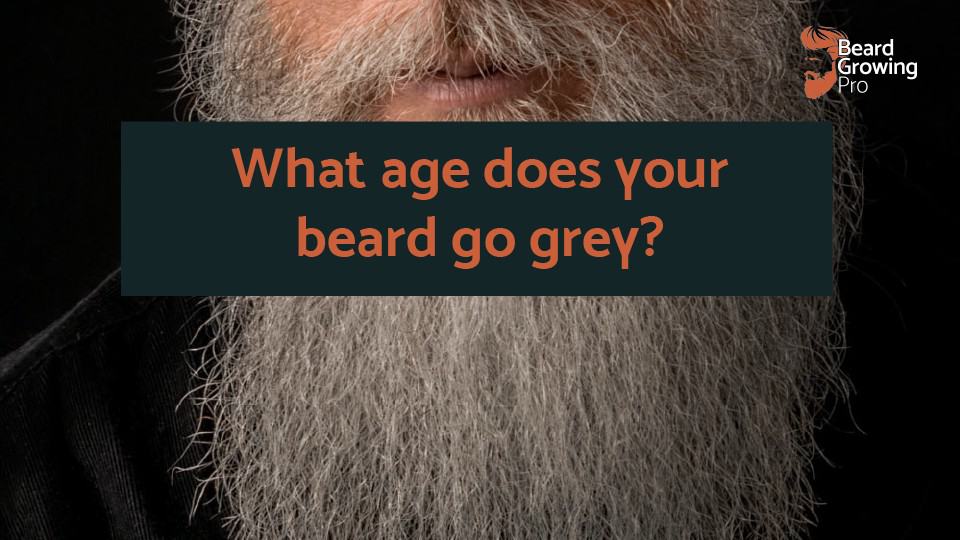It is something that we all worry about – when will my beard go grey. I am a 35-year-old man and in the last couple of years, I have noticed my grey hairs coming in just below my sideburns on my cheeks. So, it’s clear that for some people it starts at about the age of 33. But what does the science say? Can you stop your beard from growing grey? And is there any benefit to having a grey beard? In this article, we are going to cover the age beards go grey and all of the things you can do about it.
In a study published in 2012, the prevalence of grey hairs on the body was: 51.5% of people had grey hair in their 30s, 81.18% of respondents had grey hair in their 40s, and 95.3% of people had grey hair in their 50s. Therefore, you are about 50% likely to get grey hairs in your 30s which increases significantly as you enter your 40s and beyond.
The study looked at a total of 522 men and 480 women recruited between the ages of 12 and 91 years old. Clearly, this doesn’t specifically look at beard hair is going grey, but I think it is still a good indication of the age that you can expect to find grey beard hairs.
Article Contents
Grey hair in beard at 35 – my experience
I have always had very dark hair. The hair on my head (when I had it) was dark brown and my beard has always been a collection of dark brown, black and orange hairs.
When I was about 30 years old, I think I noticed my first hair. I was convinced that it was just the symptom of a well-conditioned and nourished beard and that it was purely the light reflecting off the surface of my beard.
However, this fantasy was short lived when I realised that my beard hair was actually going grey. Since the age of about 33 to 35 there was no denying that my beard was going grey.
I first noticed it on the sides of my beard just under my sideburns. My plan is to just let my beard grow grey however it wishes to turn colour. At the moment, I have no plans to die my beard but that may change as I get older.
Other interesting science about beards
In 2012 there was a study which looked at the 50/50/50 rule of thumb which states that “at the age of 50 years, 50% of the population has at least 50% grey hair”. The researchers wanted to find out whether or not there was any truth in the simple rule of thumb which is commonly spouted by ageing people.
The study looked at the natural hair colour of 4192 healthy male and female volunteers. The scientists found that between the ages of 45 and 65 years of age 74% of people had grey hair. Men had significantly more grey hair then women in that age range. They also found that people of Asian and African descent showed less grey hair than those of a Caucasian origin at comparable age ranges.
They calculated the percentage of people which had at least 50% grey hair coverage. Looking at the data that was only 6 to 23% according to the ethnic and geographical origin and natural hair colour. This means that it is well below the 50/50/50 rule of thumb.
Because this study looked at a significant amount of grey hair (50%) I would imagine that below the ages of 45 there would be the onset of grey hair. This would support the study mentioned, above.
An interesting study published in 2019 look at the perception of how good a doctor is based on the colour of their hair. Scientists looked at patients treated at a Swiss tertiary care hospital between 2013 and 2016. They investigated associations of gender and physical appearance within hospitals mortality and the perceived quality of care which was assessed by a telephone interview 30 days after admission.
The study found that patients treated by grey-haired doctors had a significantly lower in-hospital mortality rate. That just goes to show that if you have grey hair on your head or beard it is (at least in the case of doctors) an indication that you are more likely to survive your hospital visit.
At what age beard becomes white?
Beard hair becomes white when it loses all pigmentation during growth. Pigmentation is imparted into the hair as it grows out from the hair root. Pigment cells called melanocytes produce two types of pigment cells and include them in the growing hair.
As you age these pigment cells stop being produced and included in the beard hair. When there is a complete lack of pigment that is when beard hairs become white. The age at which this happens depends on each individual. Their genetics and environmental exposure factors play a huge role in determining when a beard becomes completely white.
A completely white beard is normally not achieved until well after your 50s but you will probably see grey, or white, hairs in your 30s. If you want to make your beard white check out my other article – how can I make my beard white? 10 temporary and permanent solutions – click here to be taken to article.
Does a grey beard make you look older?
There is no doubt that having a beard makes a man look older, wiser, and more aggressive. For a full run down on what the science says check out my science-based article – do beards make you look old? [What the science says] – click here to be taken to article.
A beard has been scientifically proven to make you look older. A study published in 2013 found that men with beards can look up to 8 years older than men without beard. The longer the beard the longer the men were perceived to be. Other studies have also shown that celebrities with beards look up to 10 years older.
This fact, in combination with the societal perception of age being related to grey hairs, leads me to suspect that a greybeard will make you look older. Whether or not that is due to the fact that you have a beard rather than its colour – science will have to work that one out.
However, on a purely subjective basis there is no doubt that if I see someone with a grey, or white, beard I perceive them as much older and wiser than I would if they didn’t have a big white or grey beard.
Are grey beards attractive?
I scoured the Internet for studies and forums which investigated the opinion about greybeards and their attractiveness. I found that there is a huge portion of people who think that grey makes a man look more attractive. I wrote another article on this exact subject. Click here to be taken to my article – are greybeards attractive? Results from online polls.
There was a poll on the famous matchmaking site – match.com. On that pulse 72% of respondents said that having grey hair makes a man look more attractive. This is surely a massive win for men with graying beard or hair!
If you want to know more about this topic check out my YouTube video where I answer this exact question:
Should I let my beard go grey?
Does stress turn your beard grey?
Despite a load of posts on the internet claiming that stress causes your hair to turn grey – the experts have proved that this is not true!
Professor Rodney Sinclair from the University of Melbourne told the daily mail that this stress doesn’t cause hair or beards to go gray.
Professor Sinclair says that the genetic factor is the single biggest determinant in causing graying of head and beard hair. Despite many studies looking into it, there is nothing to suggest that stress, diet or lifestyle has any impact on the colour of hair.
How do I stop my beard going grey?
Based on all the science we know there is only one thing that we can do to prevent beards going grey. We need to restore the body’s ability to produce melanocytes at the root of the hair.
The good news is that a group of French scientists have identified a series of chemical agents that could protect the stem cells that produce the hair pigments.
This enables pigment production to restart as soon as the next hair cycle begins.
The chemicals are said to work by mimicking the action of an enzyme called DOPAchrome tautomerase. This enzyme is the naturally occurring antioxidant in the hair bulb that protects melanocytes from damage. By mimicking that action, we may have a way to prolong the production of the pigments.
What causes a beard to go grey?
There are many causes of a beard going grey. It is likely that your beard is grey and simply because of the combination of your age and your genetics. However, the graying can be accelerated by things like smoking and not eating enough antioxidants so that oxidative stress ages your beard hair quicker.
Here is a quick rundown on the things that make your beard go grey.
Genetics
I’m afraid to say that genes are the biggest cause of you turning gray. A 2016 study highlighted the first ever gene that the researchers were able to associate with graying.
Head hair and beard hair go grey for the same reason. Hair contains cells called melanocytes which are pigments that create colour in the hair (eumelanin =black and brown, pheomelanin = yellow and red). It’s the eyelashes that contain the most of these pigmented cells and that is why they are a little darker than most on your head.
As time goes on, the pigment cells start to dye away. They are normally replenished by stem cells at the bottom of the hair root – but that process simply stops working.
Age
Your beard is constantly regenerating. As hairs fall out new hairs grow in their place. Hair grows in three stages and the cycle repeats over and over again until the hair follicle is no longer able to create hair.
As you get older your beard hair follicles are less able to create the pigment cells which get incorporated into the hair as it grows. The age at which your pigment cells no longer effectively make hair changes from person to person. I know of some people who started having their first grey hairs in their 20s and some 70-year-olds who never lost their dark hair.
Oxidative stress
Oxidative stress can prematurely accelerate the presence of graying in your beard. Free radicals are unstable molecules that are formed in the body through normal metabolic processes or UV rays. Your body is quite effective at mopping up these reactive molecules however you can give it a boost by eating a load of different healthy foods. These include:
- blueberries
- dark chocolate
- strawberries
- raspberries
- spinach
- beetroot
- Kale
- carrots and other orange vegetables
- artichokes
- and more…
As long as you are eating a balanced and complete diet you will be able to easily ward off the effects of oxidative stress on your beard.
Smoking
A study published in 2013, looked into smokers hair and investigated the question: does smoking cause premature hair graying?
This study was conducted in a non-clinical setting and included 207 participants. The participants were classified into two groups which were premature hair graying and normal hair graying stop premature hair graying was defined for the case of this study as the appearance of grey hair before the age of 30.
The study found that there was a significant relationship between the onset of grey hair before the age of 30 (premature graying) and smoking cigarettes. The prevalence of smokers in the premature hair graying group was higher at 40.2% versus 24.7% for normal hair graying. By using some complicated mathematics smokers were found to be 2 ½ times more prone to develop premature hair graying.
I think based on this study we can confidently say that if you are a smoker you are much more likely to end up with premature grey beard hair!
Does stress turn your beard gray?
Despite a load of posts on the internet claiming that stress causes your hair to turn grey – the experts have proved that this is not true!
Professor Rodney Sinclair from the University of Melbourne told the daily mail that this stress doesn’t cause hair or beards to go gray.
Professor Sinclair says that the genetic factor is the single biggest determinant in causing graying of head and beard hair. Despite many studies looking into it, there is nothing to suggest that stress, diet or lifestyle has any impact on the colour of hair.
Summary
This article has looked at the age at which your beard goes grey. It depends on a variety of factors with the most important ones being age and genetics. However, premature graying was determined to be before the age of 30. Science has shown us that there is a significant amount of people that develop grey hairs on their body after the age of 30.
Therefore there is a 50% chance that your beard. Getting grey hairs in your 30s and that increases significantly as you enter your 40s.
No matter what color your beard is I think that all beards have the potential of being awesome. Whether or not you choose to keep your beard grey or dye it as long as you are happy with it that is all that matters!



